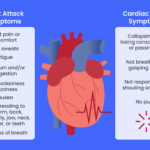Pain is your body’s way of signaling that something might be wrong. Sometimes, the discomfort doesn’t appear where the actual problem is. This is known as referred pain.
Referred pain can be confusing, but it’s important to take it seriously. It may point to issues with vital organs like your heart, lungs, stomach, liver, or kidneys. Recognizing the signs early and consulting a doctor can make a big difference.
Below are common types of referred pain and what they could mean.
1. Chest Pain or Discomfort
Chest pain can sometimes be linked to the heart. While not all chest pain is heart-related, it should never be ignored. If you feel tightness, heaviness, or discomfort in your chest, schedule a check-up with your doctor.
2. Pain in the Left Arm
Heart-related issues may also cause pain in the left arm, shoulder, or hand. This kind of discomfort is a classic sign to seek medical advice promptly.
3. Pain in the Shoulders or Neck
The lungs can sometimes cause pain in nearby areas such as the shoulders or neck. If this pain comes with shortness of breath or a persistent cough, consulting a lung specialist is important.
4. Pain Under the Right Ribcage
The liver, located on the right side of your abdomen, may cause pain under the ribcage if something is wrong. Discomfort may also radiate to the neck or shoulders.
5. Abdominal Pain
Pain just below the breastbone or in the upper abdomen can be linked to the stomach or pancreas. While issues like acid reflux are common, persistent or severe abdominal pain should be checked by a doctor.
6. Pain Around the Belly Button
Pain in the navel area can be caused by conditions affecting the small intestine. Since it may be minor or serious, it’s best to have a doctor evaluate it.
7. Pain in the Middle-Lower Abdomen
Discomfort in this area may point to large intestine problems. If dull pain near the belly button shifts to sharp pain in the lower right abdomen, it could be appendicitis—a condition that requires immediate medical care.
8. Pain in the Lower Abdomen, Pelvis, or Upper Legs
Pain in the lower abdomen, hips, or thighs may be connected to the urinary system. Inflammation in the kidneys or bladder can trigger discomfort that spreads to these areas.
Final Thoughts
Referred pain is the body’s way of sending an alert about potential health concerns. While not every pain means something serious, listening to your body and consulting your GP is always the safest choice.







